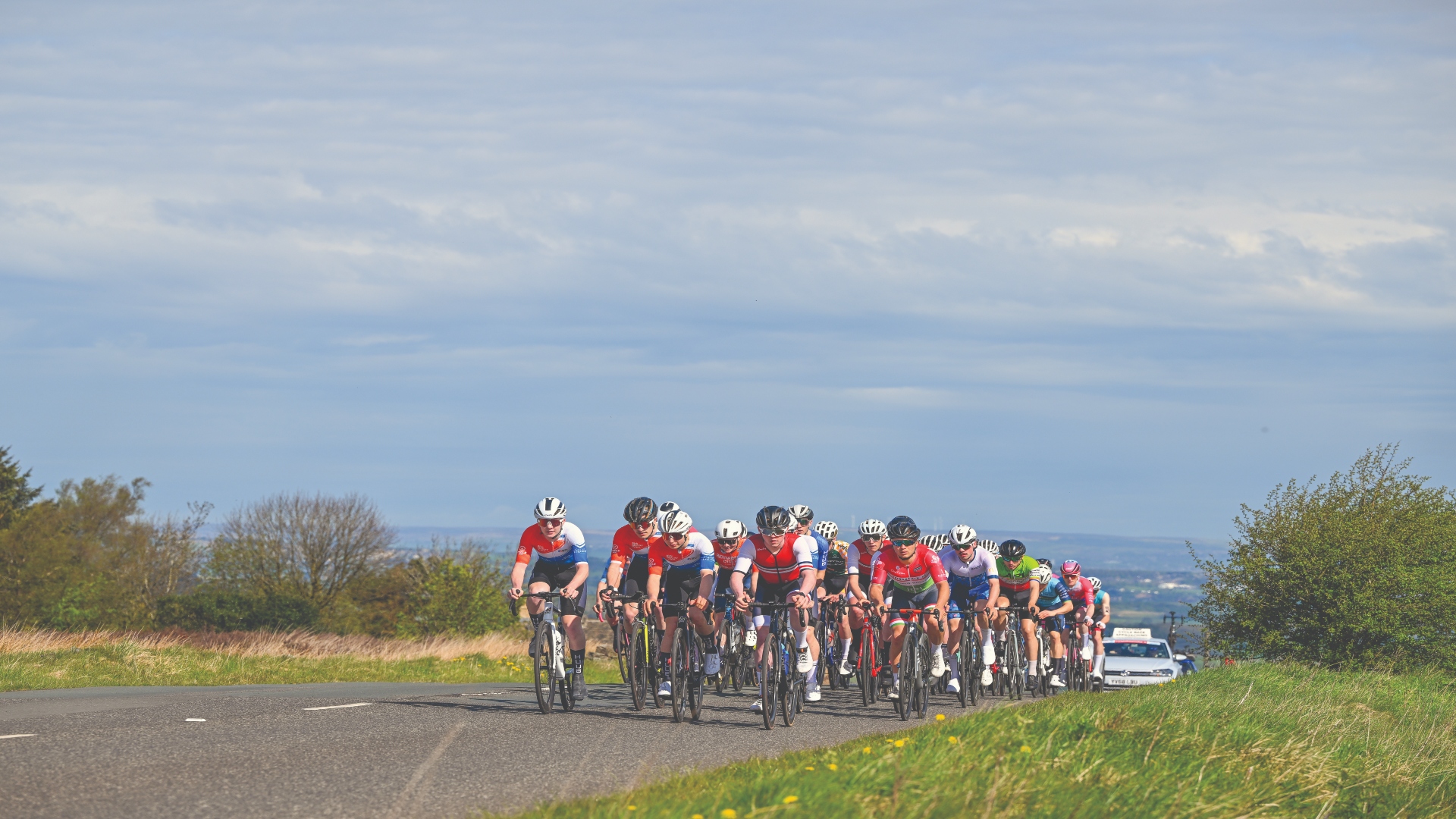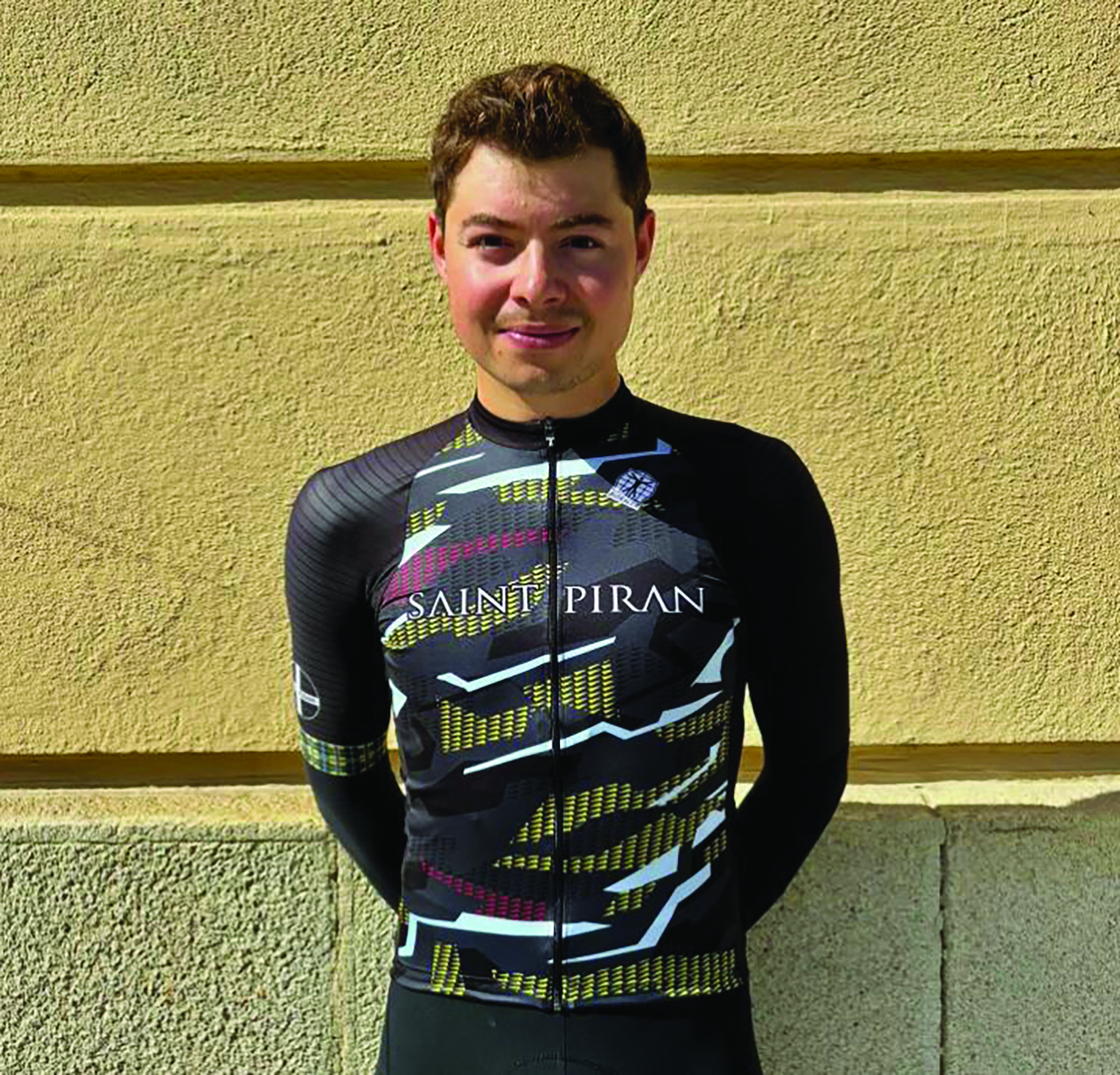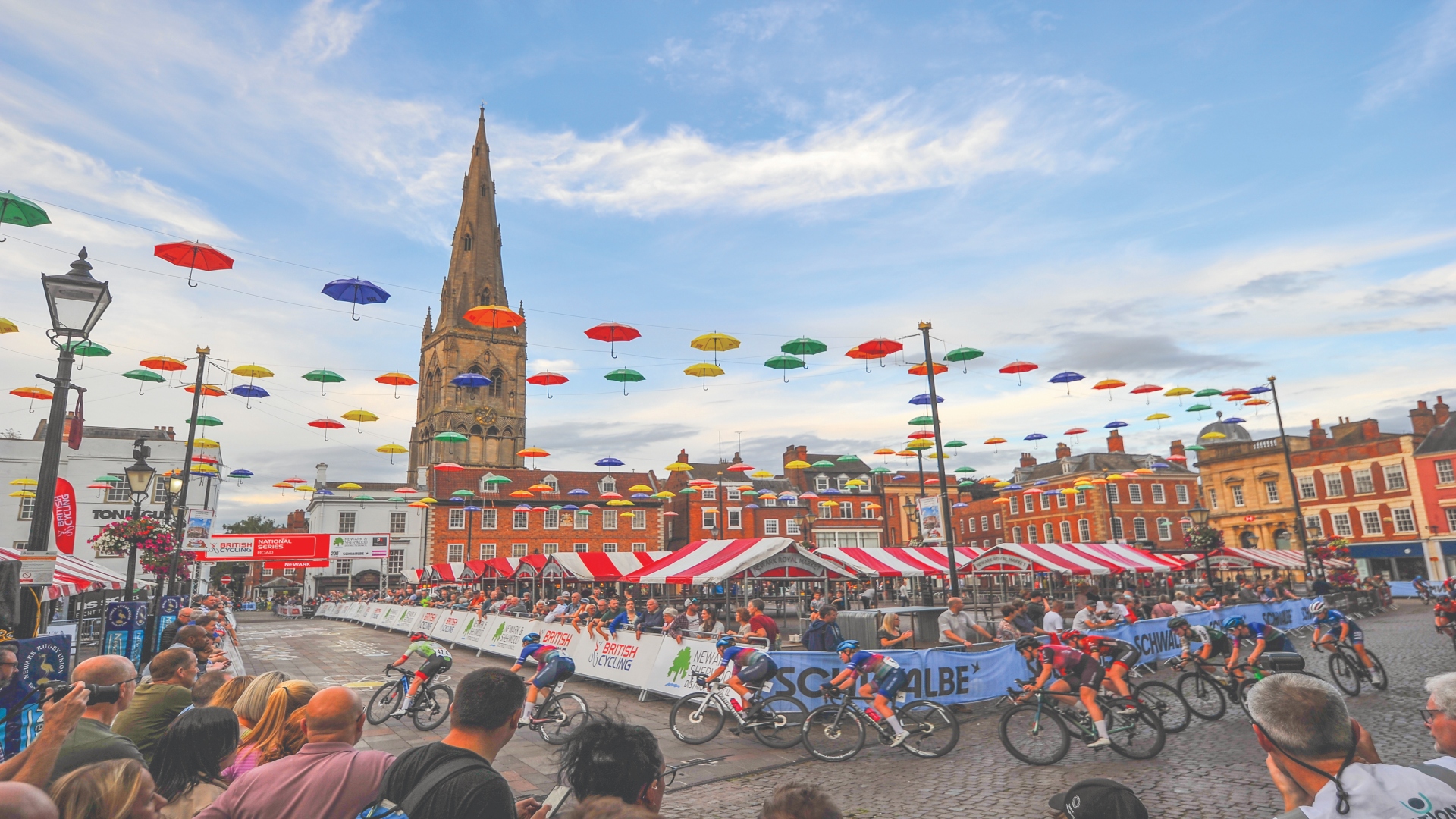
This piece was originally published in May 2024.
Given all the doom-laden headlines and social media posts over the past couple of years, you would be forgiven for thinking the UK domestic road racing scene is in a state of deep crisis. With teams folding, races cancelled and investment from local authorities reduced, it is clear the scene faces stern challenges. But how bad is the situation really? I decided to speak to race organisers, team directors and riders to find out.
Looking back at a seemingly brighter past, there were six British men’s UCI Continental teams in 2019 and 2020. There are now just two in 2024, the fewest in 15 years, with one of them, Trinity Racing, apparently in trouble. Some of the UK’s biggest races have been cancelled or are under threat. The Tour de Yorkshire, a prestigious UCI stage race previously won by WorldTour stars Thomas Voeckler and Greg Van Avermaet, was discontinued in 2019. That race, aside from boosting the Yorkshire region, also served as a shop window for young UK talent, who could flex their muscles alongside WorldTour riders and potentially be scouted to the highest level of the sport.
The Tour Series, criterium-style circuit races held in town centres and running since 2009, was cancelled in 2023, with organisers Sweetspot – now fallen into liquidation – citing the worst economic challenges it had faced since the inaugural 2009 edition. Meanwhile, races in the men’s National Road Series (now known as the Open Calendar), including the Tour of the Reservoir stage race and Manx International stage races, were cancelled or disappeared altogether, and in 2023 the series comprised just four fixtures. This year, there will be five open-category races and six women’s races. Next year, there will be one fewer, with the Ryedale GP disappearing.
The UK’s biggest race, the Tour of Britain, had faced an uncertain future after British Cycling terminated its working agreement with race organiser Sweetspot over unpaid right fees amounting to £700,000. The 2023 women’s race was cancelled, while the men’s edition had already faced criticism for its mostly flat parcours, which saw Visma-Lease a Bike sprinter Olav Kooij win the first four sprint stages. To add to Sweetspot’s woes, its founder Hugh Roberts and race organiser Mick Bennett recently retired. However, British Cycling stepped in to assume organisation of the 2024 race. The Tour of Britain Women took place over four stages between 6-9 June, won by Lotte Kopecky, and the men’s race comprised six stages over 3-8 September, won by Stevie Williams.
Women’s racing in the UK appears to be faring better, with six UCI Women’s teams in 2024 (the highest number ever), four elite development teams and six National Road Series races taking place this year. Added to the WorldTeam success of the Bäckstedt sisters at Lidl-Trek and Canyon-SRAM, women’s cycling in the UK seems to be on an upward trajectory. However, next year there will be no Lifeplus-Wahoo, and Pro-Noctis-200º Coffee-Hargreaves Contracting were in danger, too. Also, the RideLondon Classique will not take place, too.
Cycling's new Task Force
Responding to the challenges in UK racing, British Cycling recently launched its Elite Road Racing Task Force. Led by former Olympian Ed Clancy, and with a panel of experts including Steve Fry, Monica Greenwood and John Herety, the task force hopes to reinvigorate the ailing UK scene, making 40 recommendations. These include developing event organiser succession plans for all National Series events; a targeted sponsorship agreement for the National Series; increasing the number of UCI 1.2 and 2.2 races; ensuring delivery of the Tour of Britain and a UCI Women’s WorldTour stage race in 2024; reviewing the national road calendar to ensure more races are held outside of the north of England; and prioritising National Circuit Series locations by audience size.
Feeling the pinch
Those closely involved in the UK scene have high hopes that the task force will make a positive impact. “If it [the task force] does what it’s set up to do, it should rejuvenate the scene,” says Steve Lampier, former DS at Saint Piran and now DS at the Decathlon AG2R La Mondiale Newgen development team. “They need time, though. If they give themselves two years, they should achieve most of it.” Why does Lampier think so many races have been cancelled, and what has been the effect? “Races are cancelled due to money,” he says. “Councils can’t afford the racing and sponsors have fallen away. When I was with Saint Piran, it was often cheaper for me to take a team to France or Belgium than to Northumbria for a Premier Calendar race, and that can’t be right.” As a successful former pro who raced for the likes of JLT-Condor and Ribble Weldtite, Lampier is a passionate advocate for UK racing. “I came up through the scene so I know how important and prestigious UK races are, and when I was DS at Saint Piran we would still take part, but the costs were astronomical.”
The UK needs more pro races, in Lampier’s view. “We’re desperate for some good UCI racing in the UK, we are missing that,” he says. “We had the Tour de Yorkshire, which is sadly gone; Ride London, which became a WorldTour race, that’s now gone; and if the Tour of Britain doesn’t happen that would be a huge blow.” In 2024 there will be just two UCI Open races – the Rutland-Melton CiCLE Classic, which was cancelled due to flooding, and the upcoming Tour of Britain. This is in sharp contrast to the six UCI races which took place in 2017.
There is no shortage of UK talent, according to Lampier, but the current lack of opportunity in the scene means many young riders are heading straight to Europe. “The top junior riders now get taken into WorldTour development squads, so they’re bypassing the UK scene. However, the flipside is, you’ve got some riders who aren’t ready to step up to that level. They might be talented but are still raw and require experience before they can make the step up. Equally, I do believe If you’re talented enough you’ll find a way, but this still doesn’t improve the health of the UK scene.”
Domestic Racer's View

Harry Tanfield, 29, competed in the World-Tour, first with Katusha in 2019, then with AG2R La Mondiale in 2020 and Qhubeka NextHash in 2021. He's now back in Britain riding for Saint Piran.
CW: Assessment of the current UK scene?
HT: With the lack of teams in this country, prospects aren’t great for UK riders. Riders will need to take a ride from any foreign development team over a UK team if they want to go pro, which is unfortunate.
CW: Why is this happening?
HT: Cycling is a relatively popular sport here but it’s not easily accessible to watch either on TV or online. Even with sites like GCN/ Discovery, they won’t broadcast UK races. [Some UK races are broadcast on monumentcycling.com, available for £4.49 per month.]
CW: So, coverage is a big issue?
HT: The UK needs to find a way to offer more coverage. Money talks and cycling can’t go on without it. If there’s no coverage, no one’s going to get into cycling.
CW: Is it harder now for young riders to reach the WorldTour?
HT: Yes. I was noticed by winning at the Tour de Yorkshire and doing well in the National Road Series. The Tour of Britain is important but that’s in trouble. Unless riders compete in UCI races abroad it's hard for them to get seen.

Decline in volunteering
Traditionally most races were organised by clubs, but British Cycling reported a 7% decrease in membership numbers for the year ending March 2023. With most cycling clubs being BC-affiliated, this decline is troubling, and the lack of club- organised races is a clear consequence. James Hawkins, current race organiser and former rider at elite development team Cycling Sheffield, now runs Yomp Bonk Crew, a Sheffield and Peak District- based collective hoping to reinvigorate the UK scene. He explains the challenges his organisation faces: “Running a bike race or team in the current climate is very difficult. If you’re a company sponsoring a team or a race with £5-10k to spend, when a recession hits, the first thing you do is try to pull that money back.”
Hawkins explains that a lack of volunteering, still the lifeblood of domestic racing, along with a lack of club- organised races, is having a detrimental effect on the British scene. “Clubs used to be more keen on promoting races and having club members racing,” he says. “If you didn’t race for your team, you’d race for a club, but that’s happening less now. Now you’ve got people racing for teams who don’t put races on or who don’t marshal, and it makes it harder for the scene to survive. We need more people getting involved to keep the scene going.”
Quality over quantity
As mentioned, there are currently just two UCI men’s Continental teams in the UK, Trinity Racing and Saint Piran. Dominating the UK racing scene last season with regular victories, including a one-two-three at the Lincoln Grand Prix, Saint Piran have also been flexing their muscles on the Continent, gaining valuable UCI points and race experience. While performing well domestically does boost career prospects, it is more often success in larger European races that seals signings to WorldTour teams.
Saint Piran team director Richard Pascoe challenges the negative view on the UK scene. “Is it actually in poor health?” he asks. “OK, there are fewer teams, but let’s say there were four UK UCI teams with 16 riders each – how many of those riders are actually of a UCI standard? I’m not sure there are 64 riders of that quality to choose from in the UK. I think for the resources and the talent pool that we have at our disposal, three teams would be the ideal number.” Pascoe is clear that it’s the quality, rather than quantity, of a rider’s race programme that counts. “If you want to turn pro from the Conti scene, you have to have a very good programme,” he tells me. “That means certain races in the UK and certain races in Europe. WorldTour teams are looking for UCI points, it’s as simple as that.”
Pascoe takes aim at the cycling media for being overly critical, homing in on the 2023 edition of the Tour of Britain as a race he believes was unduly criticised. “I don’t think it was a failure,” he argues. “The crowds were big, [and] it was fast, aggressive racing throughout. It provided a platform for our riders to get noticed by WorldTour and Pro teams. I think overall we need the cycling media to be less negative. We’re all part of the same ecosystem and it’s in all our interests to showcase UK cycling in its best light.”
Following the summer of 2012, which saw British Olympic success on both the road and track, along with Bradley Wiggins’s Tour de France victory, there was a UK cycling boom. However, this feels like a distant memory, with cycling once more relegated to niche sport status. However, the UK has a knack of producing top-level talent. British WorldTour debutantes this year include Finlay Pickering (Bahrain-Victorious), Lukas Nerurkar and Jack Rootkin- Gray (both EF Education-EasyPost). Meanwhile, 21-year-old Joe Blackmore, recently promoted to Israel-Premier Tech’s WorldTour team, has already won three stage races this season, as well as the U23 Liège-Bastogne-Liège. Even so, it should not be taken for granted that the UK will continue producing such talent. There needs to be a healthy UK racing scene in order for young riders to show their skills and hopefully reach the top of the sport.

The challenges ahead
Some of the challenges facing the domestic racing scene include a relative lack of public interest in cycling, with a 29% drop-off in participation between March 2021 and December 2023, according to the Cycling Traffic Index. The UK is also a densely populated country with increasingly heavy traffic, which makes holding road races difficult. Negative attitudes towards cycling and unfavourable headlines in the right- leaning press add further headwinds.
From speaking to race organisers, riders, team directors and sports directors, the consensus is that the most talented riders will always find a pathway to the top. But more work is required, both at a grassroots level and from British Cycling, to ensure more races take place, more people volunteer, and that races are safe, numerous and accessible, so as to boost public interest and provide a greater and more visible incentive to would-be sponsors. All eyes are on the Elite Road Racing Task Force, which certainly has its work cut out.







